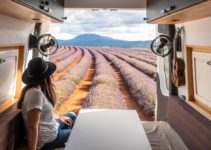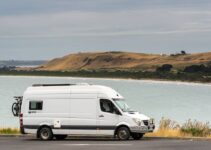If you’ve ever wanted to hit the road on an epic adventure, without breaking the budget for expensive accommodation or splashing out on a fully kitted campervan or RV, then car camping is a fantastic way to travel!
Even if you’ve never camped, it’s your first trip, or perhaps it’s been a while since your last night away from home, a car camping mission is something easy and that anyone with a licence can do.
But before you throw some blankets and snacks in a vehicle and skid out of the driveway for a barrage of awesome car camping trips, there are a few tips you need to know.
By reading our comprehensive blog post filled with everything you need to know for your first car camping trip, you’ll be a pro in no time!
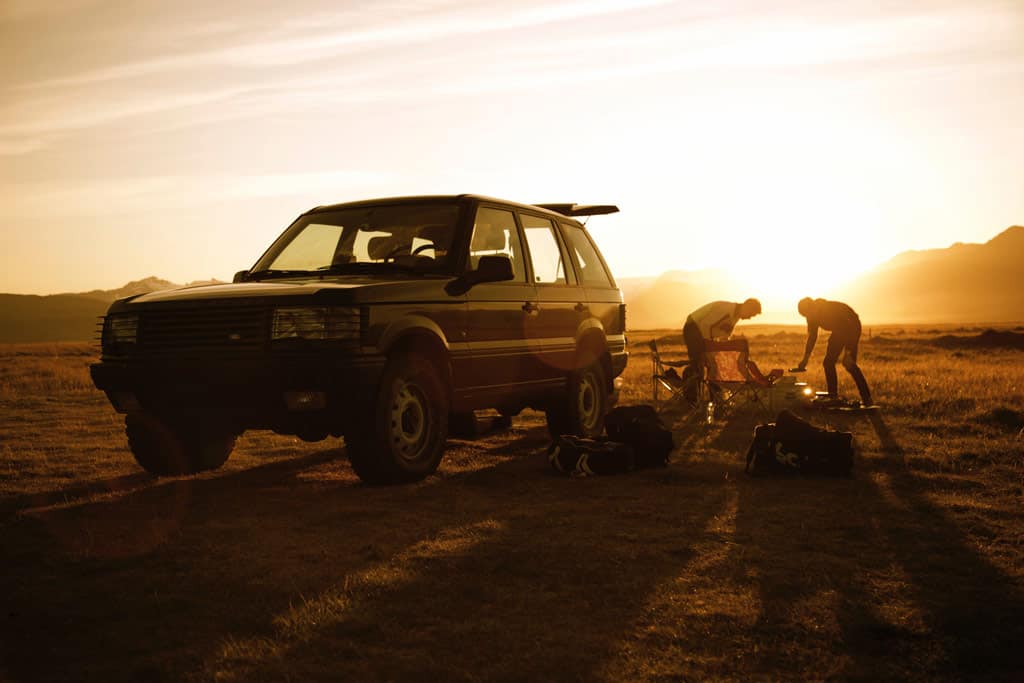
Car Camping Essentials
The first thing you’ll need to have a successful, enjoyable and comfortable camping adventure are some car camping essentials!
Let’s get into them.
READ MORE: Ever wondered what it’s like to live in a van full-time? Check out our epic guide!
Your car
Yes a car is part of car camping gear! You obviously need your car for a car camping trip, but you also need to do all the appropriate checks before leaving.
Make sure you swing by gas stations to fill the tank with fuel, check your water, coolant and oil levels, and have a quick look over the engine to see if nothing is loose or making or strange noises.
Check your tyre pressures and make sure you have a jumper leads in your car just in case.
The last thing you want is find a remote camp to park overnight then get stuck out in the middle of nowhere during your camping adventures.
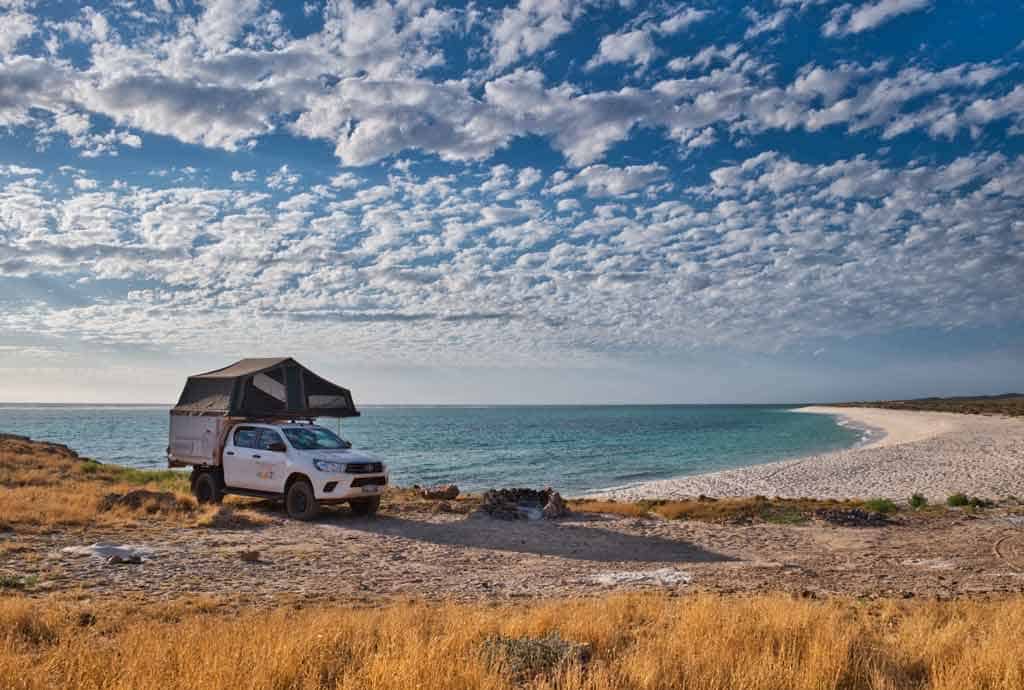
A Place to Sleep
You have two options – sleeping in your car, and sleeping outside of your car. And both have their pros and cons.
Sleeping inside your car is fantastic because it will be warmer, and arguably safer if you are doing dispersed camping (staying outside of official campgrounds) or somewhere crazy like bear country.
The downside to sleeping in your car is you may feel pretty cramped if you have a small vehicle, especially if you try to pass out in the driver’s seat.
The alternative is to stay outside of your car, and you can do this in two different ways as well.
Our personal favourite way is to have a rooftop tent, which mounts to your roof and folds out or pops up quickly with all your sleeping gear already inside.
Benefits to this type of tent is that you are off the ground (away from any creepy crawlies and puddles) and depending on the model you get it sets up and packs away very quickly.
The other benefit of this type of tent is that all your sleeping gear is not stored inside your vehicle, leaving more room for personal items.
The other way is by using a normal tent which you can pick up from outdoor stores.
We absolutely love sleeping in our tent, but if you’re trying to stealth camp on public lands it might be hard to get away with pitching a tent.
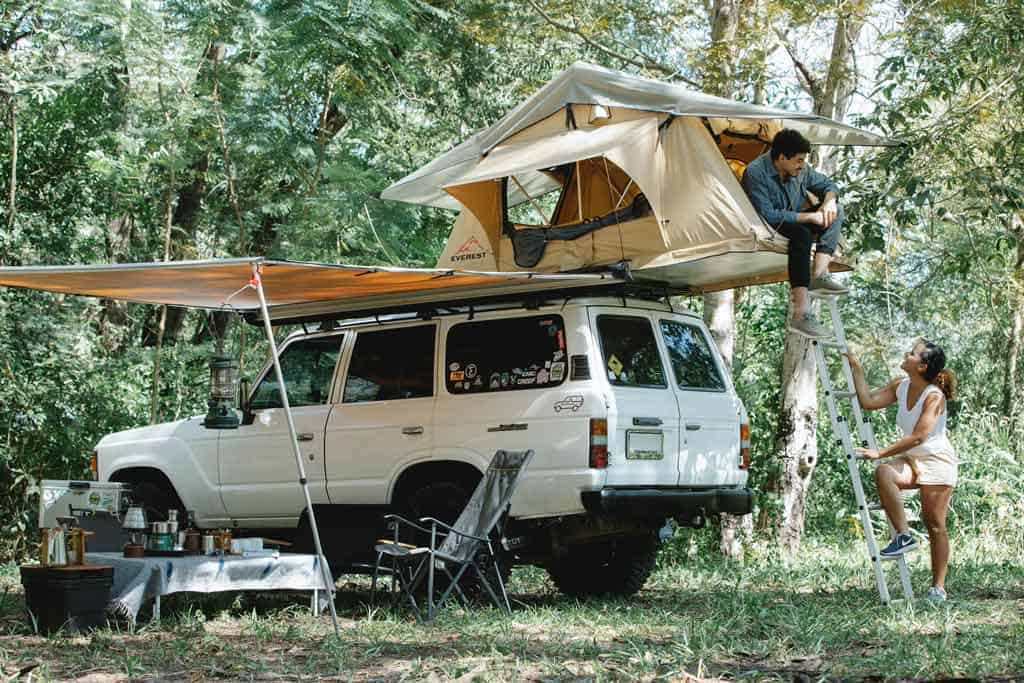
Plastic Bins
As tempting as it is to just open the trunk and throw all your gear in the back (expert tip: don’t do that), your life will be so much better if you do a bit of organisation.
Do yourself a favour and go out and buy some plastic storage bins, and have a packing plan for each one.
For example you can have one for all your food and cooking equipment, one for all your clothes, one for your sleeping gear, etc.
Then when you store them in the car, you know exactly where everything is so you can grab the right bin at the right time.
Not only does it help stay organized, it also keeps your car much tidier.
Check out our post on campervan hacks for more storage ideas.
Low Temperature Sleeping Bag and Pillow
Unless you’re living in the tropics, one of the most important car camping essentials is a low temperature rated sleeping to stay warm.
That way when the temperature drops in the evenings you will not risk a sleepless, chilly night, or worse, hypothermia.
Of course heavy blankets also work, but the reason we say sleeping bags is that they pack down a lot smaller (remember, space is everything when you’re sleeping in your car), and they are designed to keep you warm in the elements.
The mummy-shaped sleeping bags are great for keeping your body heat in and wrapping around your head.
These types of bags can be expensive but if you go to a secondhand store sometimes they have them for sale.
As an added extra, get a silk sleeping bag liner, which will keep you a bit warmer and keep your sleeping bag cleaner.
Don’t forget your favourite pillow (or an inflatable one), and an extra blanket if you’re sleeping in your car in snowy weather.
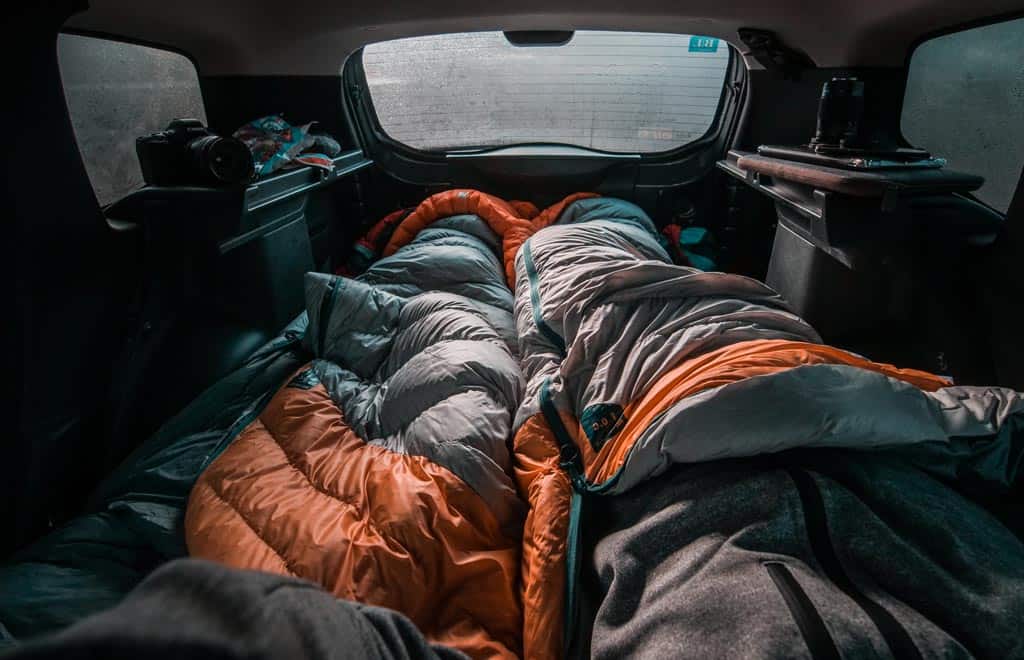
Mattress
Unless you happen to have the world’s comfiest cushions in your car, you’ll need something to lay on at night.
If you have a station wagon or SUV with a covered canopy you can always lay out a full-sized mattress, maybe even one that’s designed as a campervan mattress.
Another option is to use a sleeping pad air mattress. The benefit of a sleeping pad is it can be packed away and stored when not in use, and inflated when you need it.
Camping Stove/BBQ
When you are shopping for a camping stove or barbecue, look at ones that fold up small as your space is limited. These types of stoves are very compact and don’t have too many moving parts.
These are easy to use and the gas for them is not expensive at all. Always cook outside your vehicle as you do not want any nasty gasses going into where you are sleeping.
Bring extra gas as you might use up the bottle quicker than you think. If you can legally and safely make a campfire, cooking on the fire is a great treat too, and can help save money by not buying canisters.
Make sure you use proper fire pits or make a fire ring so you don’t accidentally spread the flames.
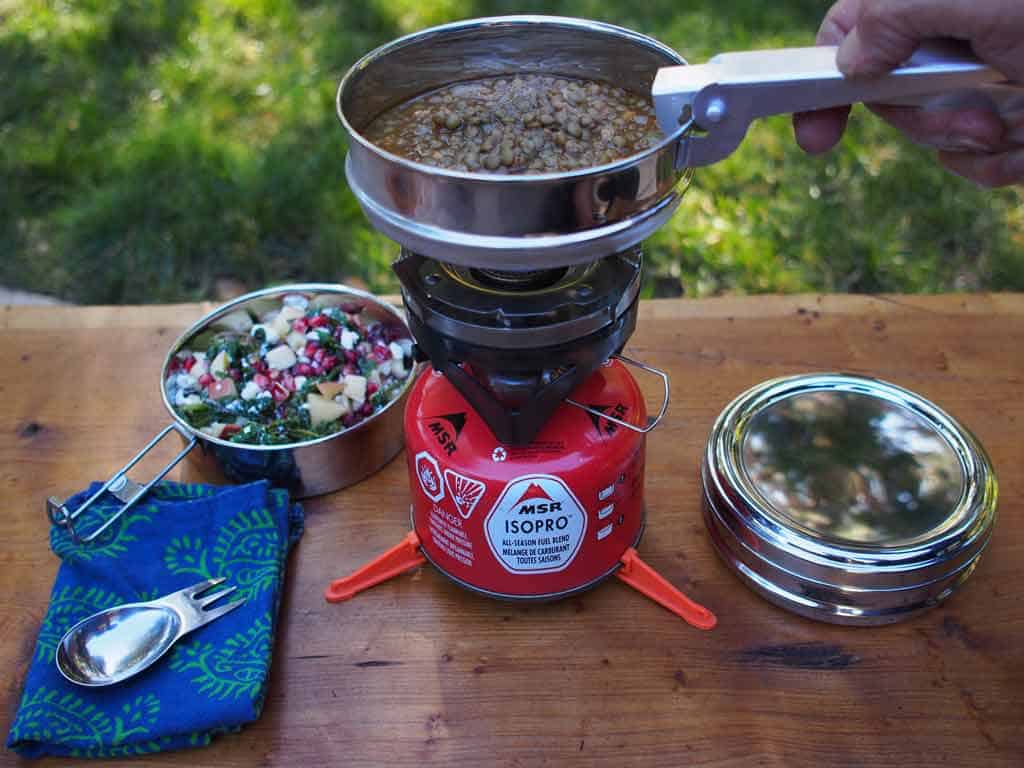
Pots and Pans
Having a portable stove or barbecue is very convenient, but you also need pots and pans to cook with.
Camping pots and pans are easy to find at secondhand or outdoor shops. You can pick them up for cheap. Don’t use your good ones from home.
If the pots and pans are metal with no plastic handles, you can pop these on the fire as well. Cast iron is great for this. Make sure you bring a mitt or pliers to take the pot or pan off the fire without burning your hands.
You can store your pots and pans with your utensils in a plastic pin to keep them all together.
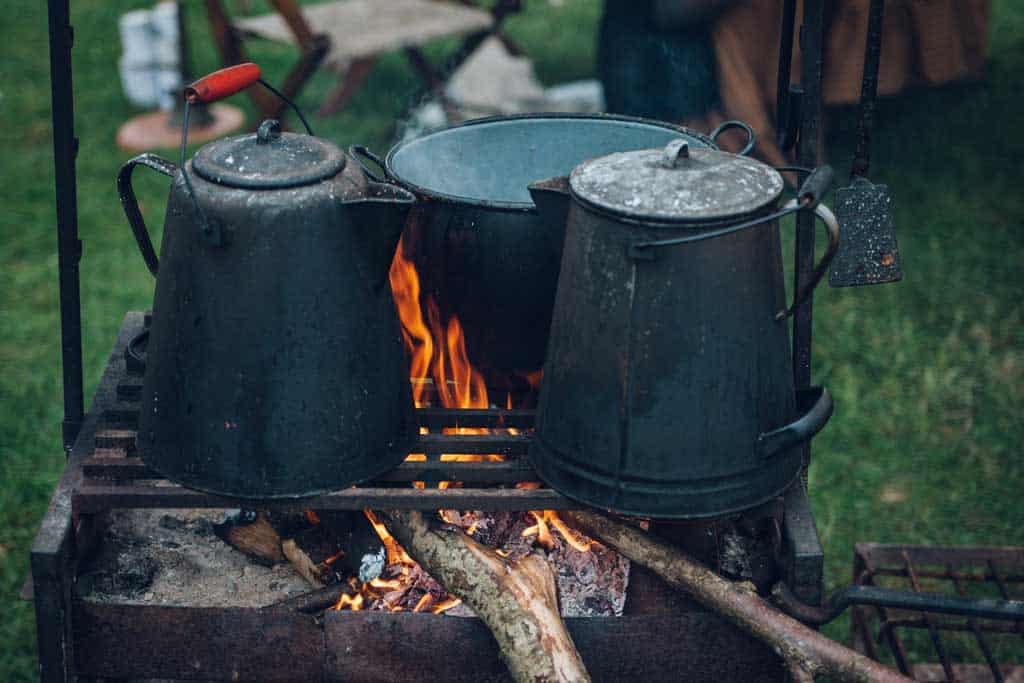
Portable Fire Pit and Fire Starters
This is a bit of a luxury, but if your car is big enough and you are allowed to have one where you are going, having a fire is a great way to keep warm, cook and also socialise with other campers.
We recommend to pack a portable fire stove for your camp. This is the most environmentally-safe and does not disturb the grounds or the animals. This one for sale is awesome.
You can have a fire off the ground and then next day when it has cooled down clean up your pit and dispose of the coals correctly in heavy duty trash bags.
When it comes to fire starters there are the obvious choices such as matches or lighters, as well as some brilliant alternatives that don’t rely on traditional methods.
The little fire starter cubes can help keep the flames burning in wet conditions too.
For fuel keep in mind that you’re most likely not allowed to collect wood in national parks, so you may have to bring your own.
Also please please please PLEASE don’t burn your rubbish. Just don’t.
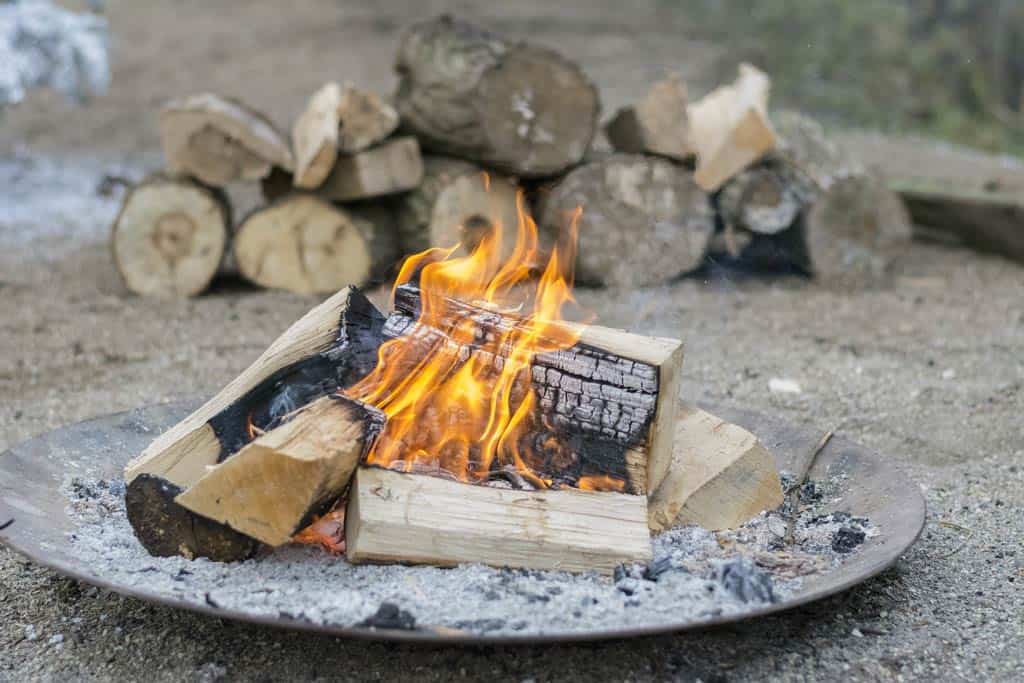
Cooler or Esky
If you’re wondering about what to do for food on your first car camping adventure, you can either go as fancy or as simple as you like.
Planning on just eating non-perishable foods like baked beans and ramen noodles? No worries. Pick them up from grocery stores, throw them in a storage bin and away you go.
But if you want cheeses, meats or even cold beers, you’re going to need a cooler or esky.
A 20L or bigger cooler is a great size to bring with you when car camping. We recommended that you make ice on the days coming up to your camping trip to keep items cool – As a bit of a hack, we use old ice cream or yoghurt containers as they will take longer to defrost.
If you have a larger vehicle you can even consider getting a dedicated 12v fridge.
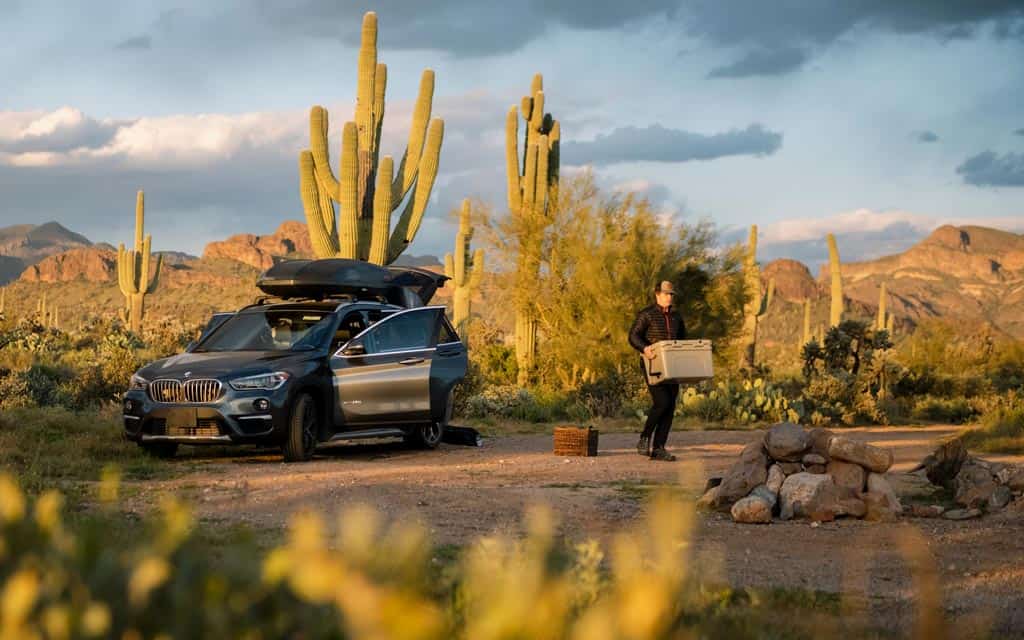
Warm Clothes
Unless your car is the size of the Taj Mahal, you’re probably going to be spending a lot of time sitting outside on your next adventure. So of course make sure you have warm clothes packed!
Even in summer the temperature can drop, especially if you’re in the mountains or somewhere windy like the coast, so stay warm and pack a jumper, windbreaker jacket and pants, wool socks and maybe even some thermals. We’re a big fan of merino wool for layering up properly.
Keeping your clothes in packing cells is a great way to stay organised.
First Aid Kit
Do not forget to pack a first aid kit. You never know what can happen when out on outdoor adventures in public lands and sleeping in your car.
You may be far from medical help so having a kit to treat yourself is essential for car camping.
It should have the basics:
- Elastic bandages and butterfly bandages of different sizes
- Small, medium and large sterile gauze dressings
- Adhesive tape
- At least 2 sterile eye dressings
- Triangular bandages
- Crepe rolled bandages
- Antiseptic wipes and cream
- Safety pins
- Disposable sterile gloves
- Tweezers and a pair of scissors
- Aspirin or Ibuprofen

Large Water Jug
A camping water jug is a great way to keep the water you need in the car. Get the ones that have a tap on the bottom and an opening on the top for easy access to refill.
Make sure the jug is BPA free and can hold at least 4L (1 gallon) of potable water at one time.
You may need a larger jug or another one if you are going off grid and there are no facilities near.
Also take a little drinking water bottle. This will be great if you go on walks or hikes as you can put it in your backpack or to have by your bed at night.
Toiletries
For car camping, you don’t need to pack a massive amount of toiletries if you are not going away for long.
Definitely pack the basics though like toothbrush, toothpaste, etc. Oh yea, and bring toilet paper.
PRO TIP – Bring baby wipes in case you’re going a few days without a shower.
LED Headlamp for car camping
One of the most used car camping essentials you’ll end up having is a LED headlamp (also one of our recommended accessories we take everywhere).
It will come in handy if you need to go to the toilet at night or get something out of your car or around camp in the dark.
Add a battery-powered lantern that you can leave on picnic tables when making dinner or sitting around the campsite and you’ll never have to bump around in the dark again.

Tool Set
Whether it’s your first camping trip or you’re a seasoned professional, if you have any plan of going off the beaten path, into national forests, state parks or hiding out on public land, then you need to get yourself a car camping tool set.
This can be used for fixing your car, collecting wood or fixing some camp items that may have broken.
For a simple tool kit, we would recommend you pack as a minimum:
- Screwdrivers and sockets
- Two adjustable spanners
- Hammer
- Axe for chopping wood
- Car jack
- Jumper leads
- Super glue
- Duct tape
Battery pack or portable solar panels for car camping
If you have any electronics that you need to charge, such as a phone, camera, laptop, etc, get yourself a small battery pack or portable solar panels so you don’t drain your car battery.
The battery packs are super useful to have and if you need any extra power for you mobile or camera while you are camping it is great to have. Plus they are more budget friendly than the portable solar panels.
If you pack portable solar panels, these are brilliant to place out in the sun and move around during the day.
Check out our top recommendations for solar panels in this article.
Of course if you’re staying at campgrounds with electrical hookups you might not need these.
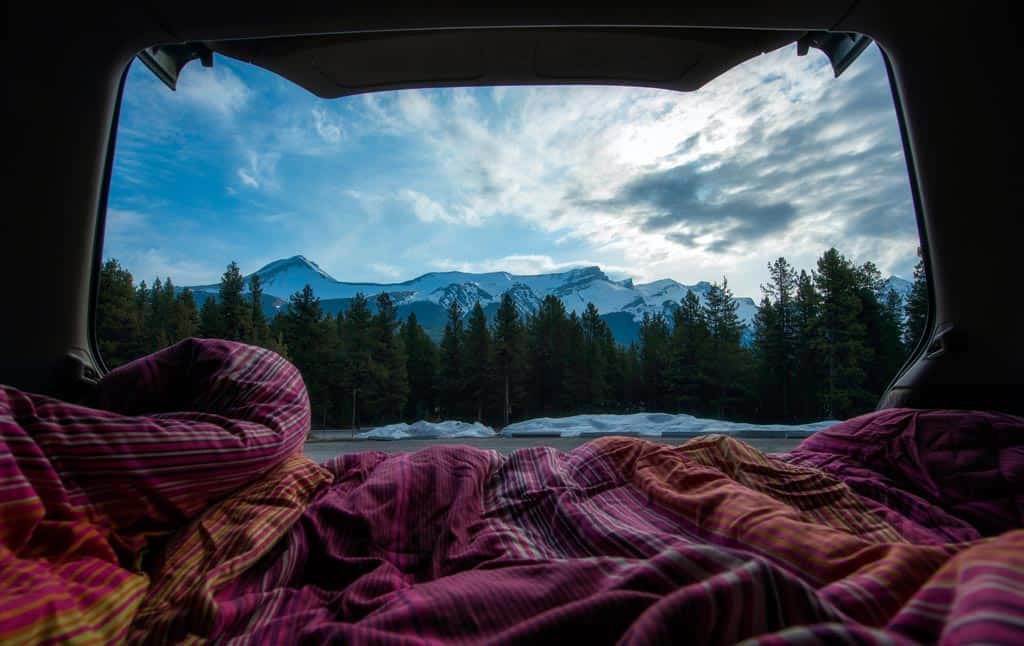
Camping chairs and table
Nobody likes sitting in the dirt, so pick yourself up a camping chair so you can grab a seat wherever you park your car for perfect camp comfort.
There are some camping chairs that fold up really small which would be great for car camping.
A folding camping table is handy as well. These portable picnic tables can be used as a cooking station then turn it in to your dining area. Then when you’re finished you can play card games in the evening. Perfect way to unwind after a big day of outdoor adventures!
By having these in your vehicle you’re not left constantly looking for a picnic table to eat at or preparing lunch on your bonnet.
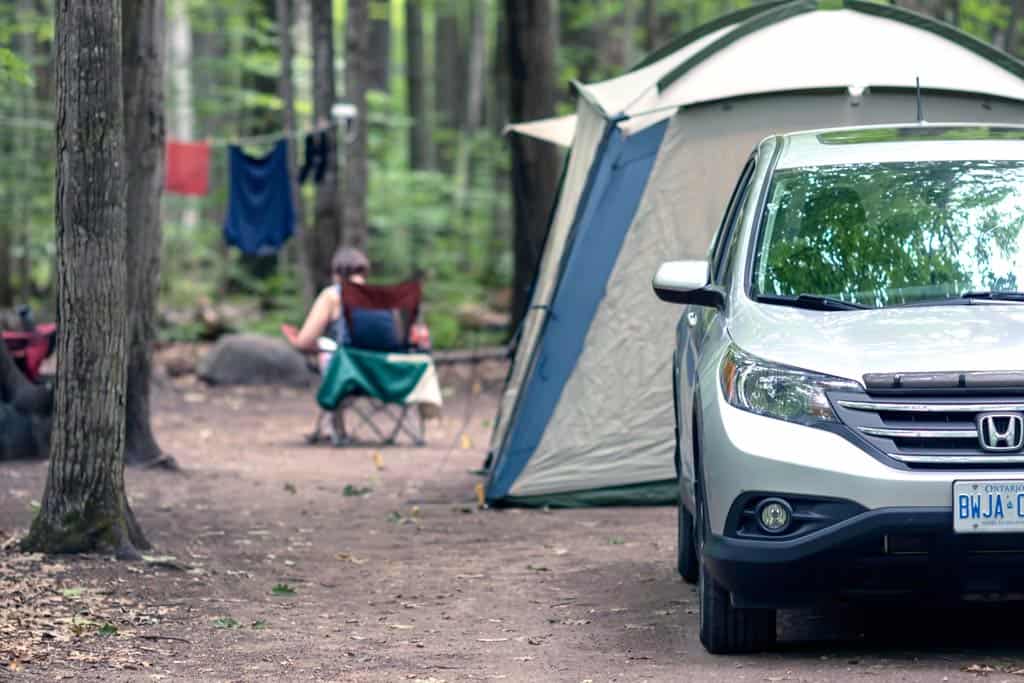
Extra Items to Consider for Your First Car Camping Trip
While you’re at it, pack some of these items for your epic car camping trip:
- Bungee cords – for tying things down such as your tent or other items
- Extra cash – you never know when you’ll need it, and most paid campgrounds only take cash
- A good book – passes the time when chilling at camp
- A shovel – for those times you can’t find flush toilets and need to go in the wilderness
- A satellite phone – pack one for emergencies if you’re going off-grid or remote hiking on your car camping trip
- Rubbish bags – for when you’re camping somewhere without trash cans around
- A map – one of the most helpful resources you will need if you’re out of phone reception
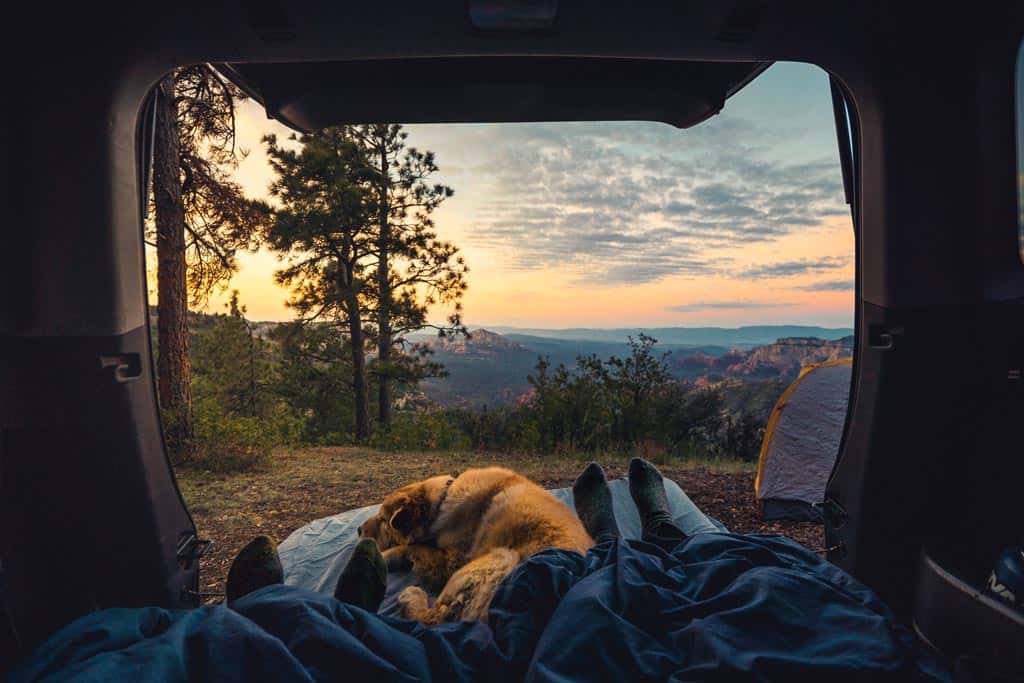
Our Top Car Camping Tips
Now that you have packed all the car camping essentials you need to make your adventures comfortable and safe, here are some of our top car camping tips.
Camping Meals and Cooking
It’s easy to become a camp chef when you’ve got a fully-stocked car camping kitchen.
Start by organising your cooking essentials in an airtight plastic bin, so they’re all in one place – and can be easily loaded into the car.
Doing some research beforehand and checking out some easy camping meals will help you and give you some ideas. Add some recipes that will feed lots of people if you are travelling in a group!
Planning your camping meals in advance and doing a little prep work at home will make cooking on the go so much easier, and it’ll save you from ending up with all kinds of excess items that you didn’t end up using.
Depending what campsite you are at you may need to take all your rubbish out with you. If you are at a paid site they will likely have rubbish bins available.
Don’t forget garbage bags for your food scraps and other trash, a fire starter to cook, and be extra careful if you are car camping in bear country.
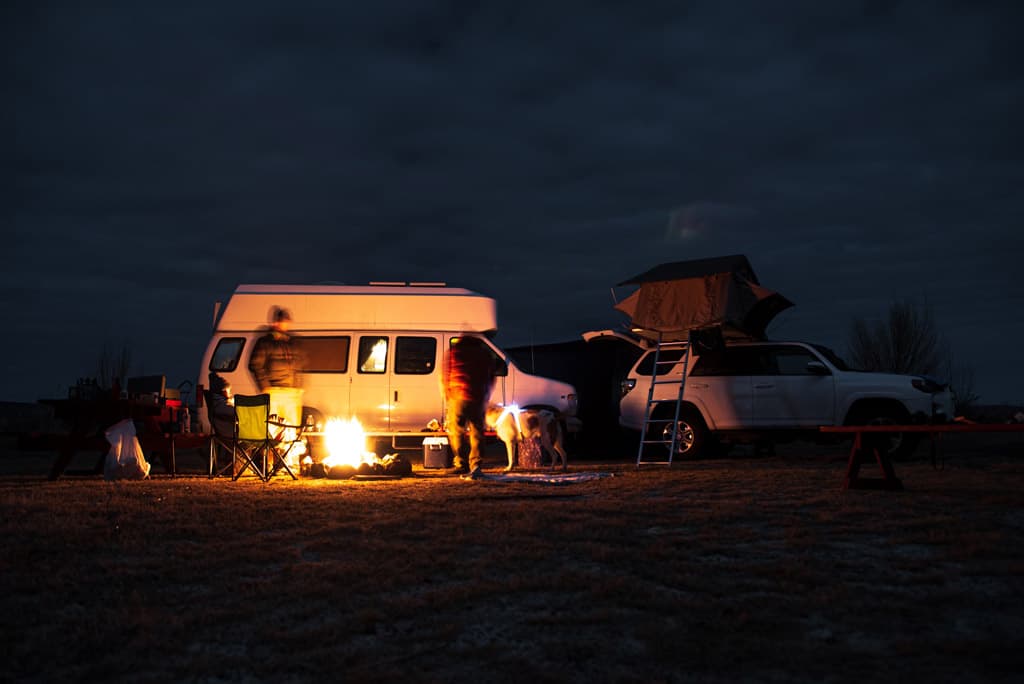
How to Leave No trace when Car Camping
If you’re planning to camp in BLM land, national parks or in the wilderness, there’s a pretty good chance that you like being in nature. So make sure you do everything you can to protect our environment for generations to come.
Nobody likes to show up to the best campsites and finding rubbish everywhere. But it’s not just people purposefully leaving trash behind – sometimes the litter and damage you find is left by accident.
So let’s all get in the habit of practicing, “Leave no trace” when we go car camping (or at any time really).
Essentially this means leaving the campsite just as you found it, or better. If you brought it with you, you take it out with you.
If you have a campfire, make sure it’s properly extinguished before you leave, and don’t burn rubbish.
Don’t throw food scraps in the woods with the excuse of it being biodegradable. Some food scraps can still take months or years to break down properly, and can be a risk for native wildlife.
It’s all common sense, and we know you’re the kind of person to pick up trash rather than leaving it behind. But it’s worth mentioning in our car camping 101 guide.
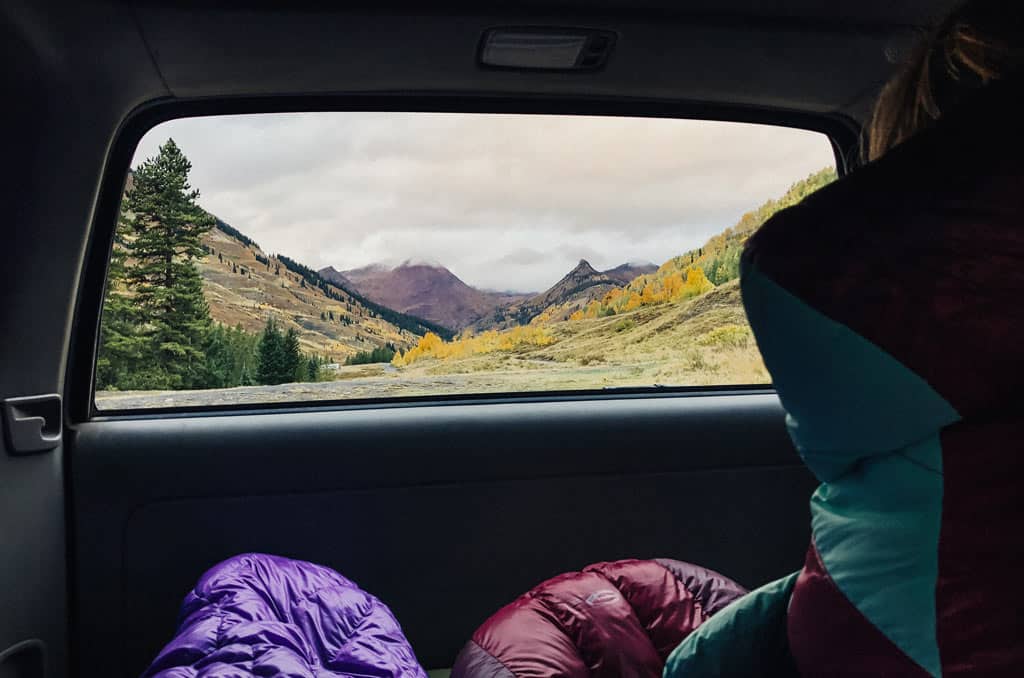
How to Pick a Campsite
Your car camping trip can be literally anywhere you can take your car, it doesn’t necessarily have to be an official campground. You can even go stealth if you’d like.
Here are some car camping site suggestions to look at when doing your research:
- National Parks – these may be free with a national park pass or a small fee
- Private Campsites – you have to pay for a campsite. Some companies are not cheap
- Free Campsites – no fee to sleep on the land. Please stay where it is located so you do not camp on someone’s property and trespass accidentally. Here’s some examples of free camping in Australia to give you an idea.
- BLM Land Management – often require a fee to stay but most campgrounds in BLM land are nice
- Gas Station – not the prettiest campgrounds, but handy and mostly safe if you need to break up a long drive by sleeping in your car
A family or large groups of friends might want to stay at a campground that has full power hookups and facilities, but some people may not want these comforts and want to be in nature at a free campsite by the river with no one around. Each to their own.
Once you have chosen your campsite, book ahead if needed, especially if it’s somewhere popular and you’re travelling in school holidays or peak season.
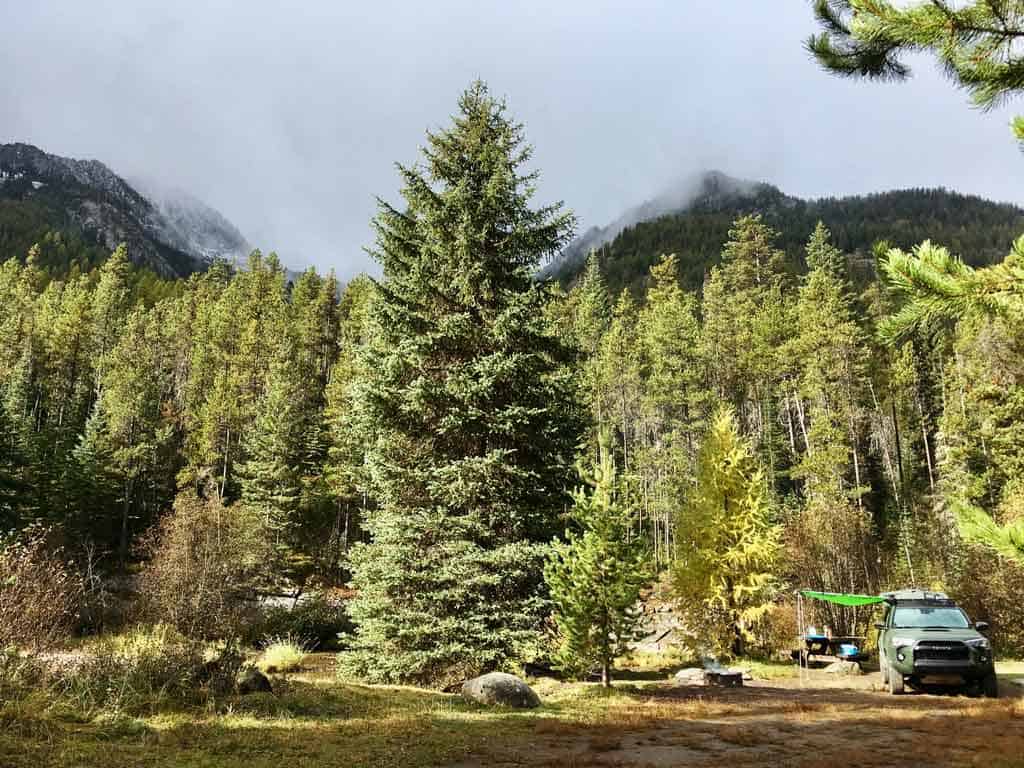
Enjoy Your Car Camping Trips
Of course the most important thing is to stay safe and have fun in these fun little adventures in your car.
Whether you stay at campgrounds, camp in your tent or sleep in your car, you’ll soon realise just how awesome car camping really is.
If you have any of your own tips such as what to pack or where to camp, leave a comment below and let us know!
This post may contain affiliate links. That means if you make a purchase a product we recommend using the links in this article, we may receive a small commission at no extra cost to you. We promise to use this pocket money to buy lots of coffee and fuel for the campervan to keep us enjoying #VanLife for just a little longer. We appreciate your support, and only recommend products we know and trust. Thank you friends!

